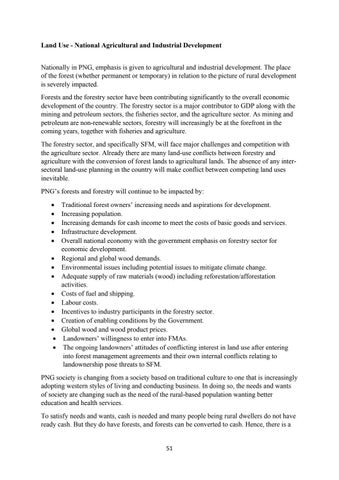Land Use - National Agricultural and Industrial Development Nationally in PNG, emphasis is given to agricultural and industrial development. The place of the forest (whether permanent or temporary) in relation to the picture of rural development is severely impacted. Forests and the forestry sector have been contributing significantly to the overall economic development of the country. The forestry sector is a major contributor to GDP along with the mining and petroleum sectors, the fisheries sector, and the agriculture sector. As mining and petroleum are non-renewable sectors, forestry will increasingly be at the forefront in the coming years, together with fisheries and agriculture. The forestry sector, and specifically SFM, will face major challenges and competition with the agriculture sector. Already there are many land-use conflicts between forestry and agriculture with the conversion of forest lands to agricultural lands. The absence of any intersectoral land-use planning in the country will make conflict between competing land uses inevitable. PNG’s forests and forestry will continue to be impacted by: • • • • •
Traditional forest owners’ increasing needs and aspirations for development. Increasing population. Increasing demands for cash income to meet the costs of basic goods and services. Infrastructure development. Overall national economy with the government emphasis on forestry sector for economic development. • Regional and global wood demands. • Environmental issues including potential issues to mitigate climate change. • Adequate supply of raw materials (wood) including reforestation/afforestation activities. • Costs of fuel and shipping. • Labour costs. • Incentives to industry participants in the forestry sector. • Creation of enabling conditions by the Government. • Global wood and wood product prices. • Landowners’ willingness to enter into FMAs. • The ongoing landowners’ attitudes of conflicting interest in land use after entering into forest management agreements and their own internal conflicts relating to landownership pose threats to SFM. PNG society is changing from a society based on traditional culture to one that is increasingly adopting western styles of living and conducting business. In doing so, the needs and wants of society are changing such as the need of the rural-based population wanting better education and health services. To satisfy needs and wants, cash is needed and many people being rural dwellers do not have ready cash. But they do have forests, and forests can be converted to cash. Hence, there is a
51









